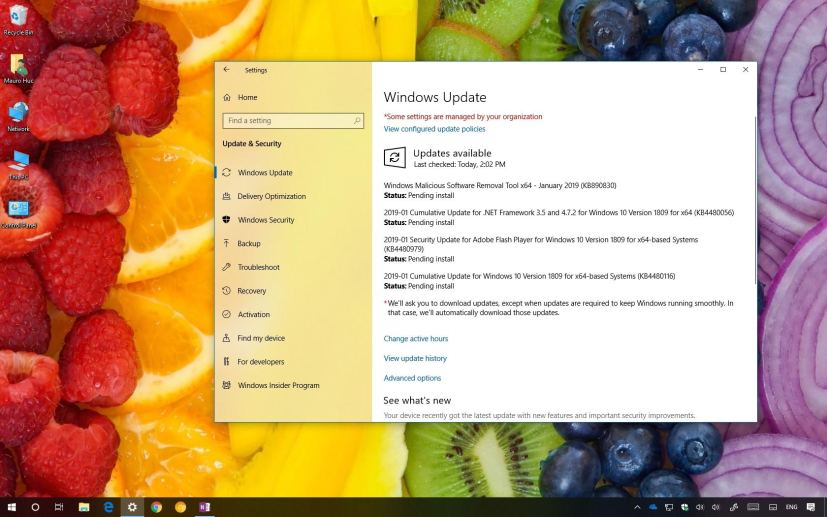As of the first Patch Tuesday of 2019, Microsoft is now rolling out update KB4480116 for Windows 10 version 1809 (October 2018 Update) to address a few problems with the latest version of the operating system.
KB4480116 bumps the version number to build 17763.253, and according to the company address security vulnerabilities, storage problems, and parches Microsoft Edge and other components.
In addition, the January 2019 rollout also delivers updates for Windows 10 version 1803 (April 2018 Update), version 1709 (Fall Creators Update), version 1703 (Creators Update), and older versions.
Windows 10 build 17763.253
Microsoft has announced KB4480116 in the Windows support site, and it’s referred as “January 8, 2019—KB4480116 (OS Build 17763.253)”. If you’re already running the Windows 10 version 1809 on your PC, this update will address these problems:
- Addresses a security vulnerability in session isolation that affects PowerShell remote endpoints. By default, PowerShell remoting only works with administrator accounts, but can be configured to work with non-administrator accounts. Starting with this release, you cannot configure PowerShell remote endpoints to work with non-administrator accounts.
- Addresses an issue in which using esentutl /p to repair a corrupt Extensible Storage Engine (ESE) database results in a mostly empty database. The ESE database is corrupted and cannot be mounted.
- Security updates to Microsoft Edge, Internet Explorer, Windows App Platform and Frameworks, Windows MSXML, Windows Kernel, Windows Storage and Filesystems, Windows Wireless Networking, Microsoft JET Database Engine, Windows Linux, Windows Virtualization, and the Microsoft Scripting Engine.
Windows 10 build 17134.523
The April 2018 Update (version 1803) is getting update KB4480966, and the Windows support site referred it as “January 8, 2019—KB4480966 (OS Build 17134.523)”. If you’re already running version 1803 on your PC, this update will address these issues:
- Addresses a security vulnerability in session isolation that affects PowerShell remote endpoints. By default, PowerShell remoting only works with administrator accounts, but can be configured to work with non-administrator accounts. Starting with this release, you cannot configure PowerShell remote endpoints to work with non-administrator accounts.
- Security updates to Internet Explorer, Microsoft Edge, Windows App Platform and Frameworks, the Microsoft Scripting Engine, Windows Kernel, Windows Storage and Filesystems, Windows Virtualization, Windows Linux, Windows MSXML, and the Microsoft JET Database Engine.
Windows 10 build 16299.904
The Fall Creators Update (version 1709) is getting update KB4480978, and the Windows support site referred it as “January 8, 2019—KB4480978 (OS Build 16299.904)”. If you’re already running version 1709 on your PC, this update will address these issues:
- Addresses a security vulnerability in session isolation that affects PowerShell remote endpoints. By default, PowerShell remoting only works with administrator accounts, but can be configured to work with non-administrator accounts.
- Security updates to Internet Explorer, Microsoft Edge, Windows App Platform and Frameworks, the Microsoft Scripting Engine, Windows MSXML, Windows Kernel, Windows Storage and Filesystems, Windows Virtualization, Windows Linux, and the Microsoft JET Database Engine.
Older version of Windows 10
Although the version 1703 (Creators Update) is no longer supported, organizations running the Enterprise or Education edition of Windows 10 are getting KB4480973, which addresses similar problems as the newer versions and bumps the version number to build 15063.1563.
Windows 10 version 1607 (Anniversary Update) is also no longer supported, but organizations with devices still running this release can now download and install KB4480961, which fixes same issues as the update for version 1073 and bumps the version number to 14393.2724.
In addition, Windows 10 version 1507 (original release) is getting an update as well even though it’s no longer a supported version. The update is described as “January 8, 2019—KB4480962 (OS Build 10240.18094),” and it addresses the same issues like the update for version 1607.
Download January 8 update for Windows 10
These updates are available immediately, they’ll download and install automatically, but you can always force the update from Settings > Update & Security > Windows Update and clicking the Check for updates button. You can find more details about the most recent updates in the Windows 10 update history tracker guide.

